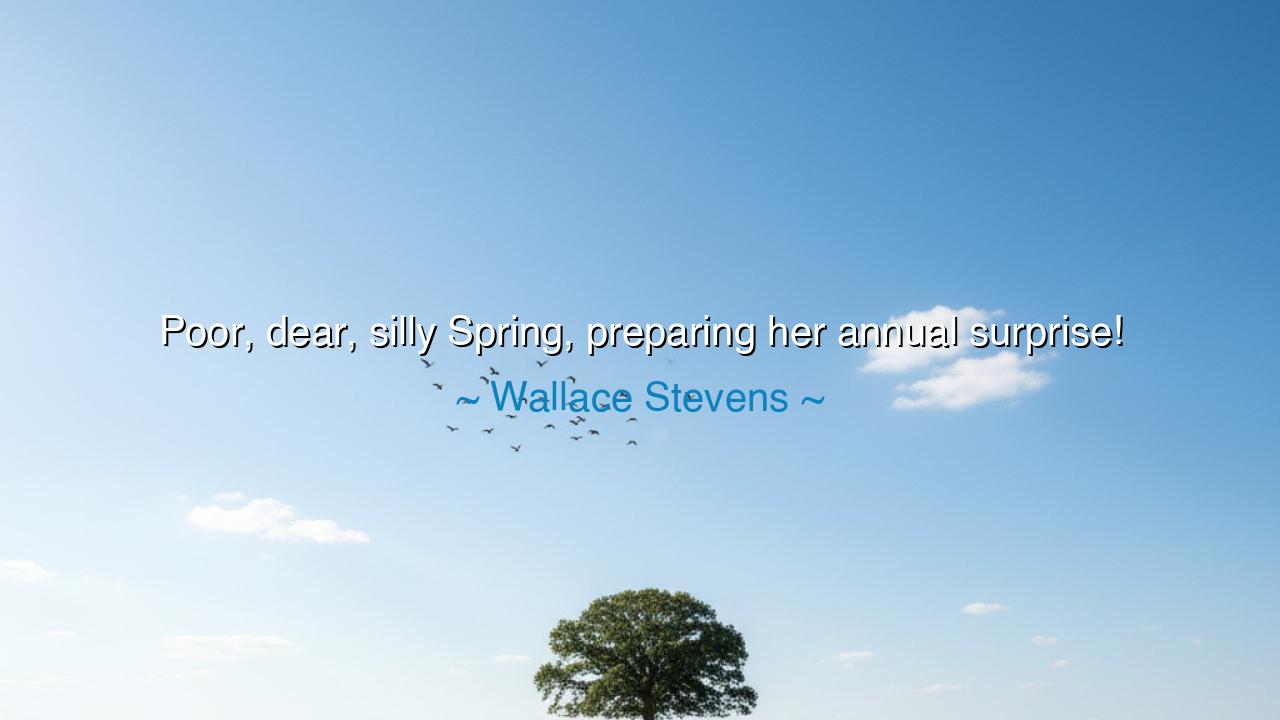
Poor, dear, silly Spring, preparing her annual surprise!






Wallace Stevens, the poet of imagination and reality, once mused: “Poor, dear, silly Spring, preparing her annual surprise!” In this gentle yet profound line, he captures the eternal rhythm of the seasons, the wonder of renewal, and the paradox of familiarity and astonishment. For each year, Spring arrives as though for the first time—bud and blossom, bird and breeze—yet we know she always comes. It is a surprise that is not a surprise, a miracle that is expected, and yet no less miraculous for its certainty.
The origin of this thought lies in Stevens’ lifelong meditation on the tension between imagination and reality. As a man who spent his days as an insurance executive and his nights as a poet, he lived between the ordinary and the transcendent. When he speaks of Spring as “silly,” it is with affection, as though he marvels at her insistence on coming back with her bright procession of flowers, as if mankind might have forgotten her. Each Spring, to Stevens, is both predictable and astonishing: nature insists upon joy, even when men sink into despair, wars rage, or the world feels heavy with sorrow.
The ancients, too, saw in Spring a sacred renewal. The Greeks told of Persephone’s return from the underworld, heralding the rebirth of the earth. The Romans celebrated Floralia, honoring the goddess of flowers. To them, the annual surprise was the triumph of life over death, of green shoots bursting from the frozen soil. Stevens echoes this ancient truth but wraps it in modern irony—calling it “silly,” because the miracle comes so reliably that we almost take it for granted. And yet he reminds us: it is still a miracle.
History gives us moving moments of this truth. During the First World War, when trenches were filled with mud and misery, soldiers recorded in their letters the sudden appearance of wildflowers blooming on the battlefield. Amid the horror, Spring had returned. It was as if the earth herself whispered: “Life will not be crushed forever. Renewal is coming.” To those weary men, it was indeed an annual surprise—a reminder that even in the darkest winters of human history, the cycle of life cannot be broken.
The meaning of Stevens’ words is thus both tender and powerful. Spring is “poor” because she must prove herself again and again, “dear” because her beauty is beloved, “silly” because she seems to think her surprise is new each year. But to the human heart, weary of cold and shadow, it is always new. The arrival of blossoms, the sound of birdsong, the lengthening of days—these are gifts that stir the spirit, reminding us that hope is not an illusion but a rhythm written into the very body of the earth.
The lesson is clear: we must not grow numb to life’s recurring miracles. The rising of the sun, the turning of the seasons, the return of love and laughter after sorrow—these are no less wondrous because they repeat. Indeed, their repetition is part of their power, for they testify to the reliability of renewal. Just as Spring unfailingly returns, so too does joy rise again after grief, peace after turmoil, and strength after weakness.
Practically, let us train our hearts to be surprised, even by what is expected. When the flowers bloom, pause and see them not as routine, but as living proof that life endures. When hope rises again in your spirit after a season of despair, greet it as you would the first bird of Spring. And when you see the “silliness” of life’s repetitions, embrace them with gratitude, for in them lies the promise of eternity.
Thus Stevens’ playful yet profound words endure: “Poor, dear, silly Spring, preparing her annual surprise!” They remind us that life’s gifts often come clothed in the familiar, yet they are no less miraculous. The wise heart sees with wonder each year, each day, each breath—knowing that repetition itself is a form of grace, and that the greatest surprise is that renewal always returns.






AAdministratorAdministrator
Welcome, honored guests. Please leave a comment, we will respond soon